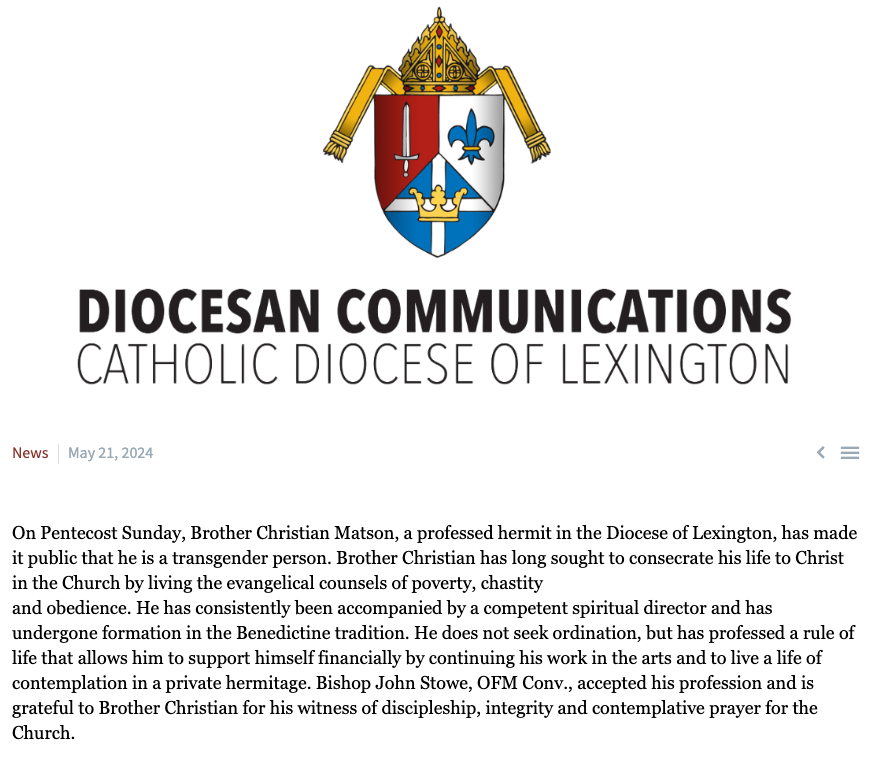(ZENIT News / Rome, 22.05.2024).- On May 21, the Catholic Diocese of Lexington, Kentucky, issued a press releasepraising a transgender “man” –biologically a woman –, for his dedication to the Church.
The Diocese’s announcement, using masculine pronouns for a biological woman, detailed how the local Bishop John Stowe supported “brother” Christian Matson’s decision. “Bishop Stowe is grateful to brother Christian for his witness of discipleship, integrity and contemplative prayer for the Church,” read the press release.
Pentecost Sunday marked a significant moment when “brother” Christian Matson, a “hermit” recognized by the Lexington Diocese, revealed publicly his transgender identity. The diocesan press release pointed out that Matson has been on a long journey to consecrate his life to Christ through poverty, chastity and obedience.
“Brother Christian has received constantly the guidance of a competent Spiritual Director and formation in the Benedictine tradition,” continued the press release. “He doesn’t seek Ordination, but has committed himself to a rule of life that enables him to maintain himself through the arts and live contemplatively in a private hermitage.”
A spokesman of the Diocese declined to make further comments on the matter. ZENIT found out that Christian Matson, 39, is a “convert.” He entered the Catholic Church in 2010, before transitioning to a masculine life. After his entrance in the Catholic Church he sought to be admitted in several masculine Orders, among them the Jesuits, but wasn’t accepted for being biologically a woman. In a dialogue with a Canonist, the latter suggested an hermitic life, as hermits also profess vows, although they don’t live a common life. Matson only needed the approval of a Bishop, and Stowe was that Bishop. Hence, in 2022 Matson made vows as a hermit.
As regards Bishop Stowe, he made news in the past for supporting the Equality Law, legislation that required religious institutions to comply with non-discrimination norms regarding gender identity and sexual orientation, which comes into conflict with traditional Catholic teachings.
In an interview with Religion News Service, Matson admitted that he is interested in challenging the Church’s teachings on the Priesthood and Ordination.
Expressing his desire to confront the Church’s position on gender, Matson mentioned specifically the Vatican’s document “Man and Woman He Created Them,” which opposes public recognition of gender choice (it seems Matson doesn’t know Dignitas Infinita, where the Dicastery for the Doctrine of the Faith sees the gender theory as a grave violation against human dignity).
In his comments, Bishop Stowe used masculine pronouns when referring to Matson, stating: “My openness to him is due to his sincere search for ways to serve the Church. Hermitage — a form of religious life that is little used –, can be for men or women. Given that there’s no search for the priesthood or sacramental ministry, and given the tranquil and separate life of a hermit, I saw no harm in supporting his vocation.”
The Code of Canon Law regulates legally hermitic life in the context of Consecrated Life. Canon 603 states:
603 § 1 – In addition to Institutes of Consecrated Life, the Church recognizes hermitic or anchorite life, in which the faithful, with a stricter separation from the world, the silence of solitude, assiduous prayer and penance, dedicate their life to the praise of God and the salvation of the world.
§ 2 – A hermit is recognized by the Law as given to God within a consecrated life, if he professes publicly three evangelical counsels, corroborated through a vow or other sacred bond, in the hands of the Diocesan Bishop, and follows his own way of life under the latter’s direction.
Thank you for reading our content. If you would like to receive ZENIT’s daily e-mail news, you can subscribe for free through this link.




